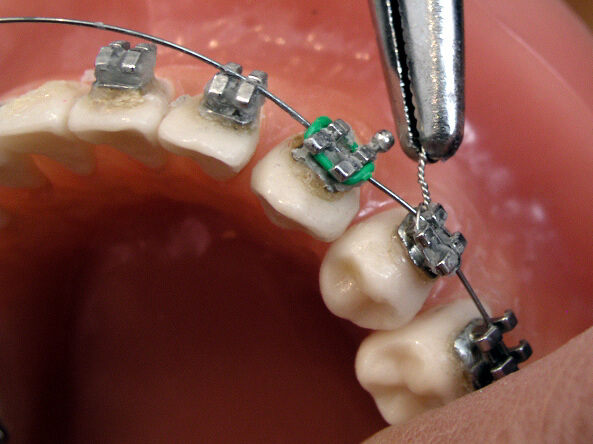Dentists often refer children and teens for orthodontics advice and support if problems are developing with crowded or crooked teeth or the way the child’s bite is impacting on the mouth and surrounding teeth. A correct bite is when the top and bottom teeth meet when the mouth is closed, while misaligned teeth can become more crooked if corrections are not made.
About Dental Braces for Kids
Braces are usually the recommended course of treatment for development problems with the bite and for prominent, misaligned or crowded teeth, they can be used to correct the most prominent teeth which are affecting the shape of the jaw bone, if treatments are started at around the age of 12.
Kids and younger teenagers aged 11 to 13 are still growing, so adjusting any problem teeth and jaw development has greater success. Successful treatment with dental braces can give kids greater self-confidence because it really does impact on their smiles and overall appearance.
Regular dental check-ups will ensure that children’s teeth and bite develop correctly, referrals to orthodontists are made when specialist advice and treatments are considered necessary. The orthodontist examines the mouth and will advise whether braces are advisable, and the type of braces needed to fix any problems.
There are several types of braces that could be recommended for kids, some of them are removable meaning they can be taken out at night, and also for cleaning and when eating meals. Other types of braces are fixed in place, if children play contact sports it will be necessary for gum shields to be worn for protection.

NHS braces are fabricated from metal, however, it is possible to have braces fabricated from plastic or ceramic materials and some of these are clear, so less visible. Some children may feel self-conscious about wearing braces, in which case private braces treatments may be a more suitable option. Invisible braces include Invisalign, Damon Braces and lingual braces, which are fixed to the back of the teeth.
Fixed braces are the most common treatments and are small brackets glued to the front of each tooth and held in place with orthodontic wire. Modern fixed braces give kids several colourful custom brackets to select, so the braces become a fashion feature and children tend to be less uncomfortable about wearing them. Fixed braces may need to be in place for up to 30 months, as the teeth need to be moved slowly and gently into the correct alignment within the mouth.
Children need to be encouraged to follow all advice given by the orthodontist regarding cleaning teeth. Fixed braces can cause a build-up of food residue and plaque, so it is important to ensure kids are keeping their teeth cleaned properly when these are in place. Some foods and fizzy drinks will have to be avoided while wearing fixed braces, these include chewing gum, sticky and sugary foods, and very hard foods such as apples, carrots and French bread, all of which can damage the wires or brackets of the braces.
Removable braces can be taken out while eating and cleaning teeth, so taking care of teeth properly and cleaning thoroughly is not so problematic. However, the fact these braces are removable may encourage some kids to take them out more frequently and make the braces treatment less effective.
Wearing braces does take some getting used to. In the first few weeks, children may find it difficult to speak properly and lisping could be a problem. These problems disappear after a few days. The added pressures on teeth can also make the mouth sore and cause some discomfort during the first few days of braces treatment. Where pressure builds in some areas, it’s possible that sores could develop on gums, regular use of painkillers can help and the orthodontist can prescribe gels or medications to clear up any sores, if they should occur.
Kids will need regular appointments with the orthodontist throughout the braces treatment, as adjustments will have to be made. Any ongoing concerns or problems experienced wearing braces can be speedily addressed and rectified to ensure the most successful treatment outcome.
How Much Do Braces For Kids Cost?
| Type of Appliance | Approximate Price |
|---|---|
| Metal | £1,200 - £3,000 |
| Ceramic | £2,000 - £5,500 |
| Lingual | £2,000 - £8,000 |
| Invisalign Teen | £2,500 - £5,000 |
